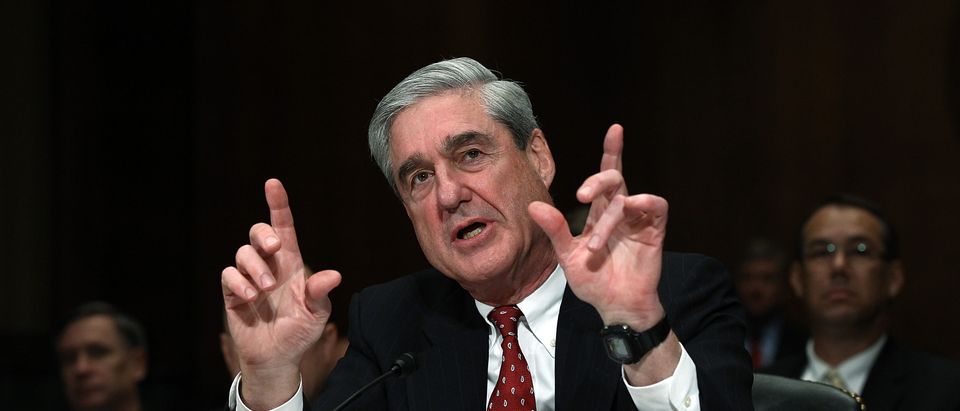The full story of Robert Mueller’s special counsel investigation of the Russian collusion myth has yet to be told, but important pieces of the tale are emerging. It is increasingly clear that Mueller exerted little to no control over what was going on. The narrative-driven image of Mueller as the steely-eyed force of justice who would take Trump down collapsed when the investigation found no Trump ties to Russia, and Mueller emerged publicly as a low energy, sometimes confused shadow of his former self. Instead, Mueller’s underlings ran the show, dragging out the pointless investigation even when they knew it was a dry hole, illicitly hobbling the Trump presidency while making sure they covered their tracks.
Last week, responding to a Judicial Watch Freedom of Information Act (FOIA) lawsuit, the Justice Department released heavily redacted documents showing that several dozen phones belonging to members of Mueller’s team were wiped or disabled before they could be examined by Inspector General Michael E. Horowitz during his office’s review of the special counsel’s investigation. In each case, the phones were somehow accidentally rendered useless. Two were “in airplane mode, no passcode provided, data unable to be recovered so had to be wiped.” Disgraced FBI lawyer Lisa Page’s phone was inexplicably restored to factory settings. Lawyer James Quarles’ phone spontaneously wiped itself. Several other phones, such as the one used by Mueller deputy Andrew Weissman, were disabled after inputting too many incorrect passwords. It should be noted that disabling an iPhone this way, including the timeouts, would take well over an hour of effort.
Could this mass wiping be viewed as criminal obstruction? Others have faced serious consequences for much less. These same fumble-fingered federal attorneys sought to imprison George Papadopoulos for 20 years simply for switching cell phones and deactivating his Facebook account. The government argued that Papadopoulos knowingly committed obstruction per 18 US Code section 1519, with the intent of impeding or otherwise influencing a federal investigation. Papadopoulos admitted doing it, but said he acted on advice of counsel. Had he instead said it was an accident because he was a tech idiot, like the Mueller lawyers, the government would have had a harder time proving the necessary intent.
It is beyond suspicious that all these phones and the evidence they held were accidentally disabled en masse just as the OIG was closing in. The story is too incredible, and the magnitude of the destruction is prima facie evidence of a coverup. This raises the more interesting question; what do these people have to hide?
One reason why Mueller team members may have believed they could get away with these practices is that the boss had clearly seen better days. For his new book “Obsession: Inside the Washington Establishment’s Never-Ending War on Trump,” the Washington Examiner’s Byron York interviewed a number of people who had worked with Mueller when he was at the height of his abilities as a sharp, no-nonsense federal lawman. But in recent years they had seen him slip. Their old friend and colleague seemed tired, both mentally and physically. Mueller’s highly anticipated July 2019 congressional testimony shocked many who had expected the special counsel to be incisive, combative and devastating. Instead they got a frail old man with nothing new to say.
Another new Judicial Watch production sheds some light on part of Mueller’s testimony. In an exchange with Republican Florida Rep. Greg Steube, Mueller had denied that he had interviewed with President Trump for the position of the FBI Director the day before he was appointed special counsel. Mueller said the meeting with Trump was to discuss the director’s position in general, but “my understanding [was] I was not applying for that job.” But the president tweeted soon after that “It has been reported that Robert Mueller is saying that he did not apply and interview for the job of FBI Director (and get turned down) the day before he was wrongfully appointed Special Counsel. Hope he doesn’t say that under oath in that we have numerous witnesses to the interview, including the Vice President of the United States!” And in a newly released May 17, 2017 email, former Deputy Attorney General Rosenstein wrote to then-Assistant Attorney General Jody Hunt with the subject line: “Mueller,” stating “Withdrew from consideration for FBI director.”
So, was Mueller lying to Congress about his job interview? And to what end? Or, as seems likely, was Mueller so befuddled he either did not know he was interviewing for the director’s job in 2017, or had forgotten that he had done so while testifying two years later? It is a shame Democrats forced the old codger to testify in their misguided attempt to spin the investigation’s conclusions away from Trump’s vindication, but they paid for it, and shredded Mueller’s reputation in the process.
Maybe the ongoing criminal investigation by U.S. Attorney John Durham will yield more information on the sketchy practices and possible obstruction of the Mueller team. Perhaps, as Attorney General Barr recently said, there will be more indictments. But even absent corrective action by the Justice Department, the more we learn about the Mueller investigation the shadier it looks.
Chris Farrell is director of investigations and research for Judicial Watch, a nonprofit government watchdog. He is a former military intelligence officer.


